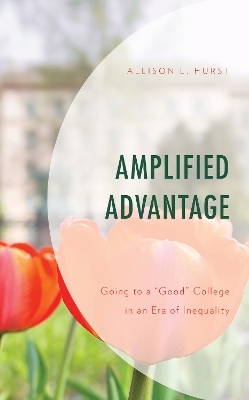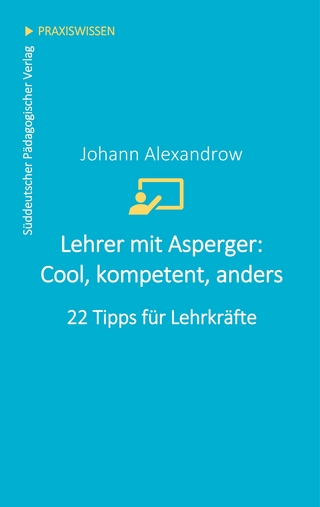
Amplified Advantage
Going to a “Good” College in an Era of Inequality
Seiten
2021
Lexington Books (Verlag)
978-1-4985-8967-3 (ISBN)
Lexington Books (Verlag)
978-1-4985-8967-3 (ISBN)
Amplified Advantage investigates the value and impact of today’s small liberal arts colleges on the students who attend them. It adds to our understanding of how class works, the impact of parents and families on social reproduction, and the consequences of attending a “good college” in an era of inequality.
Amplified Advantage investigates the value and impact of today’s small liberal arts colleges through an extended examination of a recent cohort of students attending them. It demonstrates how these colleges sometimes succeed and sometimes fail in equalizing the experience of all their students. But there is more to the book than that. Although primarily an account of life and learning at small liberal arts colleges in the US today, scholars will find much of theoretical interest underlying the account. The context of the small liberal arts college is used to unpack how class works. Unlike many other books written about class in college, Amplified Advantage is not exclusively focused on how some students fare less well than their peers, but rather how all students’ strategies are affected by their past experiences and classed expectations, particularly in the context of growing inequality. Amplified Advantage draws on Bourdieu’s theory of class, particularly his concepts of capitals operating in a field, and habitus as way of understanding agent’s structured but generative choices, to demonstrate how inequalities are met, resisted, and ultimately reproduced across generations. Chapter by chapter, the book lays out the many ways that class continues to play a role in the college experience, from choosing a major, to frequency of faculty interaction, to participation in the extra-curriculum. The last chapters demonstrate the differential burden of debt on graduates and the impact of varied parental support after graduation. Amplified Advantages adds to our understanding of how class works, the impact of parents and families on social reproduction, and the ways that colleges and universities can contribute to or reduce inequalities.
Amplified Advantage investigates the value and impact of today’s small liberal arts colleges through an extended examination of a recent cohort of students attending them. It demonstrates how these colleges sometimes succeed and sometimes fail in equalizing the experience of all their students. But there is more to the book than that. Although primarily an account of life and learning at small liberal arts colleges in the US today, scholars will find much of theoretical interest underlying the account. The context of the small liberal arts college is used to unpack how class works. Unlike many other books written about class in college, Amplified Advantage is not exclusively focused on how some students fare less well than their peers, but rather how all students’ strategies are affected by their past experiences and classed expectations, particularly in the context of growing inequality. Amplified Advantage draws on Bourdieu’s theory of class, particularly his concepts of capitals operating in a field, and habitus as way of understanding agent’s structured but generative choices, to demonstrate how inequalities are met, resisted, and ultimately reproduced across generations. Chapter by chapter, the book lays out the many ways that class continues to play a role in the college experience, from choosing a major, to frequency of faculty interaction, to participation in the extra-curriculum. The last chapters demonstrate the differential burden of debt on graduates and the impact of varied parental support after graduation. Amplified Advantages adds to our understanding of how class works, the impact of parents and families on social reproduction, and the ways that colleges and universities can contribute to or reduce inequalities.
Allison L. Hurst is associate professor of sociology at Oregon State University.
Acknowledgements
Prologue
Chapter One: Introduction
Chapter Two: A Short History of Higher Education and the Small Liberal Arts College in the US
Chapter Three: Orientation: Understanding Who Goes to Small Liberal Arts Colleges and Why?
Chapter Four: Agency and Constraint in the College Selection Process
Chapter Five: Paying for College
Chapter Six: Learning the Liberal Arts: The Curriculum
Chapter Seven: Living the Liberal Arts: Campus Life
Chapter Eight: Outside the College Gates
Chapter Nine: Graduating (in a Recession)
Chapter Ten: Conclusion: Habitus, Capitals, Game
Appendix: The School to Work Study
Notes
References
Index
About the Author
| Erscheinungsdatum | 23.06.2021 |
|---|---|
| Reihe/Serie | Social Class in Education |
| Verlagsort | Lanham, MD |
| Sprache | englisch |
| Maße | 153 x 231 mm |
| Gewicht | 485 g |
| Themenwelt | Schulbuch / Wörterbuch |
| Sozialwissenschaften ► Pädagogik ► Bildungstheorie | |
| Sozialwissenschaften ► Pädagogik ► Erwachsenenbildung | |
| ISBN-10 | 1-4985-8967-7 / 1498589677 |
| ISBN-13 | 978-1-4985-8967-3 / 9781498589673 |
| Zustand | Neuware |
| Haben Sie eine Frage zum Produkt? |
Mehr entdecken
aus dem Bereich
aus dem Bereich
Zwischen verletzendem und achtsamem Verhalten in der KiTa
Buch | Softcover (2023)
Herder (Verlag)
CHF 39,20
22 Tipps für Lehrkräfte
Buch | Softcover (2024)
Süddeutscher Pädagogischer Verlag
CHF 17,95
Theoretische Reflexionen und fachdidaktische Entwürfe …
Buch | Softcover (2022)
Springer VS (Verlag)
CHF 125,95


